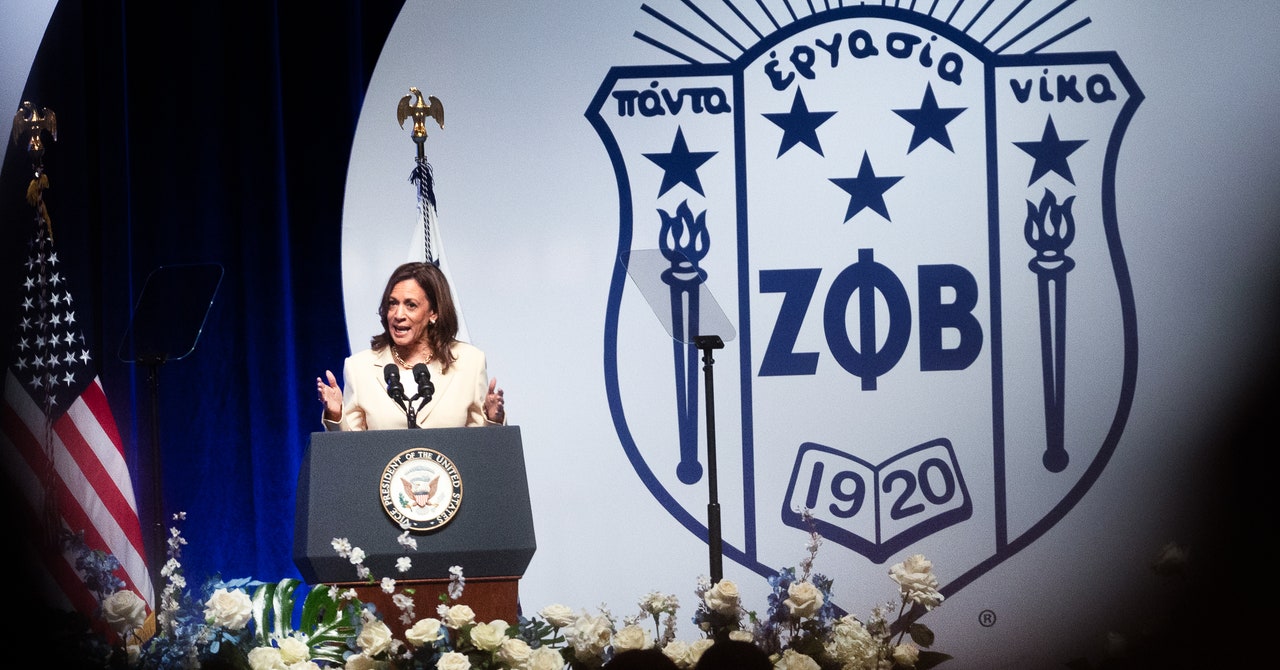The Watch the Yard platform has 2 million followers, and Rabb says its content reaches around 13 million people per month. Because Divine 9 sorority and fraternity membership is encouraged to continue after college ends, Rabb also notes that their audience is intergenerational, with Gen-Zers and boomers actively engaging with each other in the comment sections. “We can reach students in swing states. We can reach a student in the Pacific Northwest. Because there’s D9 there. If I can reach that AKA in Oregon, I can reach her peers.”
On July 30, Watch the Yard announced its official partnership with Michelle Obama’s When We All Vote. Launched in 2018, the nonpartisan nonprofit seeks to help increase participation in every election. On Watch the Yard’s Instagram, followers can simply click the link in their bio to quickly see their registration status.
“As Black people fought for our rights to vote, the Divine 9 has been constantly connected to democracy and pushing people to vote,” says Rabb. Delta Sigma Theta Sorority, the second oldest African American sorority, was at the helm of the suffrage movement as the group’s first public act of service in 1913, he notes. “When it comes to the election, this is just a continuation of the work [the Divine 9] has already been doing.”
Black Greek organizations are not only organizing online publicly but privately as well. WIRED confirmed that over 8,000 members of Alpha Kappa Alpha have created an unofficial secret GroupMe with the purpose of increasing voter turnout throughout their communities. The privacy of the group allows members to share information on key campaign platforms for both candidates, create strategic planning for voter registration in underserved communities, and share opinions on candidates without the pressure of maintaining official protocols.
While the Divine 9 as organizations are not authorized to support specific candidates, alumni from HBCUs like Howard University are campaigning. The Howard University Bison PAC, a project within the Collective PAC, a political action committee working to elect more Black officials for political equity, has brought together alumni to raise money for the Harris-Walz ticket.
Even though the PAC isn’t associated with any D9 organization, many of the PAC members are also members of the D9. According to an internal email viewed by WIRED, the first “HU Bison For Kamala” Zoom call on July 25 hosted over 4,000 attendees and raised more than $151,000 for the Harris campaign. “Within the next two weeks,” the email reads, “we’ll start our Bison PAC phone/text messaging ‘zoom parties’ to encourage Black voters in swing states to support Kamala Harris for President.”
The email to PAC members also linked to a social media best practices guide crafted by Cameron Trimble, a Howard University alum and founder of the Hip-Politics platform. The guide is titled “Ways to Be Helpful in the Digital and Social Media Landscape” and includes tips such as sharing and engaging with only positive Kamala content, not engaging in negative comments and content to avoid spiking it in the algorithm, and creating your own WhatsApp or internal group chats to share verified information for quick responses.
“We want to raise as much money as we can for Kamala. We want to make sure all Bisons [Howard students and alumni] are registered to vote, and we want to equip people with factual information to disseminate in their communities,” says Stefanie Brown James, the cofounder and senior adviser of the Collective PAC. “Long term, we want to make Bison PAC a stand-alone organization to support other Howard alumni who are running for office across the country … We want to be involved in our political process, and want to make sure we have a role in choosing who our leaders are.”

